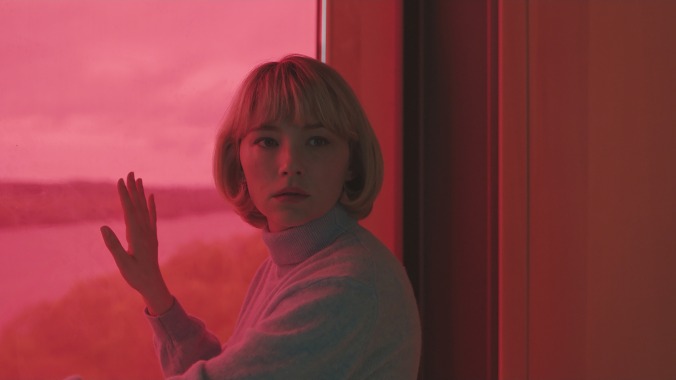Gorgeous visuals make the shocking drama Swallow go down easy


Although it’s a reductive statement, calling Swallow a high-class version of My Strange Addiction isn’t entirely inaccurate. Its heroine, wealthy housewife Hunter (Haley Bennett), suffers from a rare eating disorder called pica, which compels her to swallow small, non-food objects, the sharper and more damaging to her internal organs the better. Soon after finding out she’s pregnant, Hunter begins with a lovely little glass marble, then levels up to thumbtacks, jacks, a double-A battery, and handfuls of dirt, among other tchotchkes. The film contains multiple scenes of Bennett doubled over in pain in immaculately appointed bathrooms, as her terminally meek, deeply repressed character subconsciously punishes herself for perceived sins that won’t become evident until later. Those sins, along with Bennett’s performance, are what make Swallow more than just a beautifully shot freak show—though the visuals don’t hurt either.
Swallow marks writer-director Carlo Mirabella-Davis’ feature debut, and his command of color and composition is impressive for a newcomer. Cinematographer Katelin Arizmendi similarly comes to Swallow with only one feature film under her belt—though she’s since been snapped up as second-unit DP on Denis Villeneuve’s Dune, which says a lot about her skill level. Together, Mirabella-Davis and Arizmendi frame Swallow with coolly composed, perfectly centered mise en scène, complemented by a pervasive color scheme of rosy blush and verdant green and contrasted with the occasional shocking intrusion of the messy realities of the human body. The texture of Hunter’s silk pajamas and cashmere sweaters also comes through beautifully on screen; if her modernist, glass-walled house is a psychological prison, at least it’s a luxurious one.
The Feminine Mystique aspect of Hunter’s warped rebellion against life as a pampered but patronized incubator for her CEO husband Richie (Austin Stowell as a prototypical trust-fund asshole) is perhaps the least interesting thing about Swallow, as lushly portrayed as it may be. Mirabella-Davis does extract some effective cringe comedy out of Hunter’s plight. “I love diets!” one of Richie’s coworkers exclaims with a frozen smile on her face when he tells her he’s put his wife on a juicing regime. And the gradual escalation of Richie and his stuffed-shirt parents’ psychological abuse is effective in ratcheting up the audience’s sense of paranoia alongside Hunter’s. This tension is enhanced by the film’s immersive sound design, which puts the sound of small metal objects clinking on spotless glass countertops in the front of the mix—and the front of viewers’ minds—as we squirm with anticipation of what Hunter is about to do with that sewing needle.
Dramatically, the film really shifts into gear halfway through, in an extended dialogue scene where Hunter casually drops an earth-shattering revelation to her therapist, Dr. Santos (Laura Dias), prefacing it with, “You have to promise you’re not going to make a big deal about it.” Revealing the content of this revelation would be a disservice to potential viewers of the film, so suffice to say that it’s not necessarily any more relatable than feeling like your idle upper-class existence is slowly suffocating you to death. But it does give Bennett the opportunity to begin showing the cracks in her character’s creepily placid surface, before exploding with righteous fury and newfound self-determination in a climactic scene opposite veteran character actor Denis O’Hare. That’s when you realize that you’ve gone from seeing Hunter as an exotic oddity into rooting for her as a fully formed human being—an arc not unlike the character’s own.